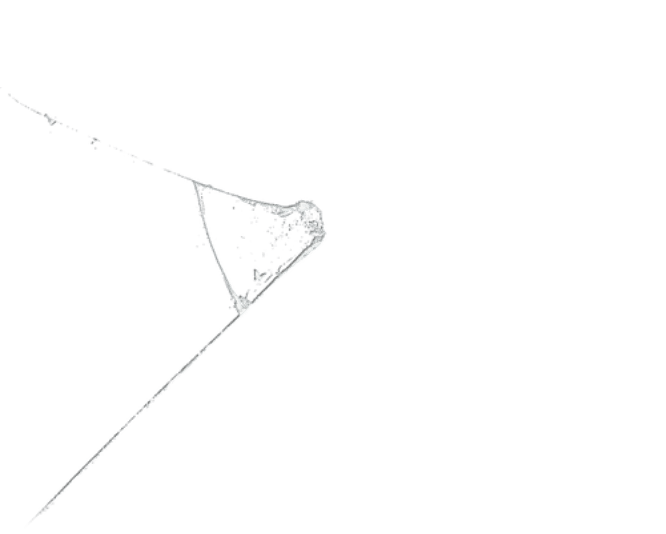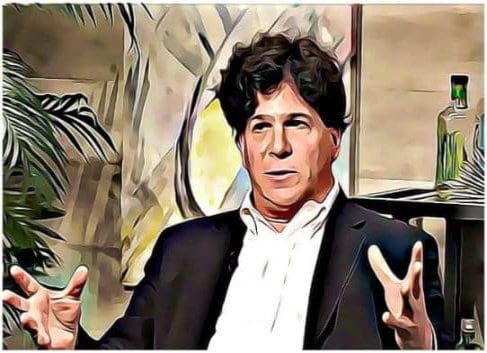Due to the many mediums through which people express themselves today, there's no clear starting point into an interesting person's worldview, or their most meaningful work.
We curate that which matters most from their expressions.
What’s shared here is reflective of events & interests pre 2020. As we know, much has changed since.
This one, below, is on Eric Weinstein.










"This appeared without warning while I was traveling. Someone I’ve never met has been quietly transcribing my interviews & curating the ideas to the point where they created a 101 tweet thread.
According to @z3nblack their curation efforts responded to mainstream media commentariat barbs, e.g. @dandrezner, suggesting there was absolutely nothing (new) here of interest..
Since one is never in the best position to defend oneself, this moved me greatly. This was a major undertaking, so I just wanted to say a heartfelt thanks to Zen Black"
According to @z3nblack their curation efforts responded to mainstream media commentariat barbs, e.g. @dandrezner, suggesting there was absolutely nothing (new) here of interest..
Since one is never in the best position to defend oneself, this moved me greatly. This was a major undertaking, so I just wanted to say a heartfelt thanks to Zen Black"

Eric Weinstein
Mathematician & MD at Thiel Capital










" This appeared without warning while I was traveling. Someone I’ve never met has been quietly transcribing my interviews & curating the ideas to the point where they created a 101 tweet thread.
According to @z3nblack their curation efforts responded to mainstream media commentariat barbs, e.g. @dandrezner, suggesting there was absolutely nothing (new) of interest here..
Since one is never in the best position to defend oneself, this moved me greatly. This was a major undertaking, so I just wanted to say a heartfelt thanks to Zen Black."
According to @z3nblack their curation efforts responded to mainstream media commentariat barbs, e.g. @dandrezner, suggesting there was absolutely nothing (new) of interest here..
Since one is never in the best position to defend oneself, this moved me greatly. This was a major undertaking, so I just wanted to say a heartfelt thanks to Zen Black."

Eric Weinstein
Mathematician & MD at Thiel Capital
Did the audience like it?
I’d say he nailed it. Great stuff there!
This is really an incredibly valuable effort and probably the best thing I’ve seen on twitter in ages. Thank you.
This is an amazing thread — a top notch, crash course in Ericology.
A long and interesting thread on creativity, contradictory ideas, self-teaching, psychedelics, breakthroughs, outsiders, Kung Fu Panda, capitalism, socialism, and more. Warning, you may not agree with everything thats said.
This is an *amazing* thread from my friends @z3nblack! Well worth your while to read the whole thing, excellent glimpse at @EricRWeinstein's insights.
This is, dare I say, excellent. Thank you for compiling many of the ideas of @EricRWeinstein thoughtfully and accurately.
@EricRWeinstein is the most interesting person I've discovered in the past couple years, and this is the best introduction to his ideas.Excellence, genius, Russell Conjugations, embracing contradictory ideas. It's all here. Written by @z3nblack.
It’s amazing how you can make a creator’s face light up by a long pause of silence while taking in their work and then asking:How.. did you do this?
It is brilliant. And accurate.
This thread here gives you more "wait, I need to think about this" moments than your avg best-selling non-fiction.
Eric is a kind soul; this thread is worth exploring for a taste of his thought. What caught my eye about this tweet was the note about areas where “rational analysis” alone isn’t enough—> where discernment is needed. The true nature of desires can’t be calculated, only discerned.
Helluva thread right here. Fantastic.
One of the most interesting threads I've ever read on Twitter.
Read this for a fun intellectual exercise. Unless you don’t like working out your brain. Then I’d stay away.
the 101
June 2018
Make sure to like & retweet the original thread on Twitter! Below is the Unrolled version for easy consumption.
1/ This is kind of a mega thread to get a glimpse into Eric Weinstein’s insights on a wide variety of subjects.
The thing about Eric is, he balances a sparkling intellect with an openness to carry out enquiries, into spaces where rational thinking alone isn’t enough.
2/ His ability to explore and articulate complex subjects with nuance and depth, makes it extremely tough to put him into any kind of box.
Sure, he's the MD of Thiel Capital, but there's so much more driving him. And these are the very things for which he doesn't get his due.
3/ Personally speaking, his views on Self-teaching / High-agency really do strike a chord.
The multiverse of topics he can traverse is quite something. As his brother Bret Weinstein says: ‘He's good at evolutionary thinking in a way I'll never be good at mathematical thinking'.
4/ Let's see if this thread works as intended. It's tricky to condense these topics into 3-4 tweets each, but I feel it’s worth a shot.
If there’s lack of context in the topics below, the expanded themes (& more) are linked up at the end of the thread.
Right, here we go:
5/ On Embracing Contradictory Ideas:
We must embrace the inconsistency of our own minds, not as a bug, but as a feature. We are in essence brought here by forces of selection: Products of systems of selective pressures.
6/ What they seem to do is create the ability to run many different programs, often contradictory programs, within the same mind. Imagine running another mind in emulation, maybe not as well as it's original owner, but we can run it well enough to understand, empathize, to argue / spar with it, to achieve some kind of better outcome.
7/ There are limits of course; we need to have certain kind of consistency of mind. But why can't we be capable of running a diehard rationalist materialist atheist program, as well as one saying I'll open myself to transcendental states? We choose to deny ourselves at our peril.
8/ On Excellence:
People wish to be part of the consensus. They wish to be excellent in their behavior and in their hope for excellent outcomes. The problem is theres a tradeoff.. that excellence is really about quality control.
9/ We want this kind of excellence in our surgeons, often, but do we want it everywhere?
For example in Jazz, if an improviser takes few risks, the music may be pleasant enough as background music, but it's scarcely the sort of thing that would've animated the bebop generation.
10/ Now we know about things like 'practice makes perfect', and we also know how to teach 'this kind’ of excellence.
But we've blinded ourselves to the role, that a different thought process is also involved, which I would associate with genius.
11/ On Genius:
The key question is who are these high variance individuals? Why are our schools filled with dyslexics? Why so many kids diagnosed with ADHD? My claim is that these are giant, under-served populations, not meant for the 'excellence' model.
12/ They are meant to be the Innovators. They bring us new forms of music (that others then seek to perfect), new scientific vistas, they explore new terrain.
We've created a system which effectively demonizes these different patterns, and makes these people feel less than.
13/ We even call these things learning disabilities, when, in fact, if you look at the learning disabled population, they very often are the most intellectually accomplished members of society. But we put them through a torture chamber of K through 12 education.
14/ Genius and Excellence are both worthwhile, but distinct modalities. Not recognizing is a serious problem. To take someone in the Genius idiom and push them into a different idiom, reducing their variance, will keep us from founding industries that'll allow us to change paradigms.
15/ If you have been told you are learning disabled or not good at math or terrible at music or anything like this, seek out unconventional ways of proving it wrong. Believe in yourself. There are structures powerful enough to make things that look very difficult easier than you imagined.
16/ On Self Teaching:
Most of us who wind up using these sort of strange high-agency hacks to negotiate the world, have some kind of a traumatic birth. We may flatter ourselves that were in touch with reality, but in fact, reality is a second best strategy.
17/ If you're lucky your family works pretty well and you never leave social reality. It's only when something goes wrong that you discover, okay, the world doesn't work in any way the way I was told.
18/ What we need to do is to create a completely secondary parallel educational structure, for people who are going to be in the high agency creativity discovery idiom, and realize, we know how to impart expertise, but we don't know how to impart creativity in genius.
19/ High-agency explanation:
When you're told that something is impossible, is that the end of the conversation? Or does that start a second dialogue in your mind, how to get around whoever it is that's just told you that you can't do something?
20/ So how am I getting past this bouncer who told me I can't come into the nightclub? How am I going to start a business when my credit's terrible and I got no experience? You are constantly looking for whats possible in a 'MacGyver' sort of a way and that's your approach to the world.
21/ On KungFu Panda:
The issue that I felt almost defines my quest is : Why can't a self teacher leave pupils? My claim is that the original innovator in the film is a Turtle which is an even more inappropriate KungFu archetype than a Panda, because they are obviously slow-moving.
22/ But when the kingdom is threatened, all they can muster is the usual collection of over-trained students: Perfect SAT kids. They are rendered incomplete by the over-teaching. So the Turtle recognizes the Panda is the only one who can save the day.
23/ But all the turtle has to go on in choosing a successor is the Panda has innovated one silly thing: To turn a fireworks cart into a makeshift rocket to jump a wall
From this humble beginning the magic unfolds, and it's really about the magic of how one self-teacher leaves a successor, and solves the problem.
24/ On Umbrellas & Innovation:
Theres nothing I like about umbrellas. They blow up in wind, so they're easily wrecked under conditions in which they're supposed to be used. They have long metal spikes at about eye level, so they're clearly a safety hazard.
25/ Everything about it strikes me as wrong. I’ve seen people try to innovate in with air blowers to blow the water away from you, funky folding designs, etc. But I'm almost positive there exists some very simple mechanical design to improve the umbrella.
26/ At the 1952 World Championships, in table tennis, the worst player on the Japanese team was Hiroji Satoh. He glued two foam expanses to both sides of a sandpaper bat and nobody could cue off of the sounds. It changed the sound of the ball like you put a suppressor on your paddle.
27/ The fact he won simply through an innovation that was that profound, shows you what the power is of one of these ideas. The power laws are just so unbelievably in your favor if you win, that it makes it worthwhile.
28/ On spotting breakthrough ideas:
It’s situation by situation. For example, in science I try to use various intellectual arbitrage techniques where if you have a bunch of smart people who have been focused on a problem, I try to look at what as a group their weaknesses are.
29/ How is their bread buttered? What is it they can't afford to say or think? For eg: In theoretical physics theres all sorts of shibboleths where, if you can't say you believe quantum mechanics is intrinsically probabilistic, you are not a member of the club, because it's assumed you sort of can't accept a difficult reality.
30/ Or if you can't signup for one of the major schools, you have no way to get funding, because no one who will support your Grant applications.
So you start to look at what causes, what should be a diverse portfolio of ideas, to collapse in terms of the diversity where everybody starts representing same POV with tiny variations.
31/ If you are looking at a problem thats never been attempted you don't want to use intellectual arbitrage - it's just blue sky. Theres no reason first attempts to think through the problem won't yield fruit.
32/ On Canonical Design:
Let's look at nature. There's a great virus called T4 bacteriophage. If you look it up it looks like a lunar lander - it’s really cool. The genetic material is held in a capsule, called the capsid, that has the form of an icosahedron.
33/ So it's a little crazy to think that before Plato ever existed, nature had figured out this complicated 20-sided object. But because it was so natural at a mathematical level, even if it was complex, nature found the canonical design even though there was no canonical designer.
Because it was a God-given form, it didn't need to be thunk up by any individual.
34/ Or recent discovery of plant hoppers using gear mechanisms for jumping. You'd think we'd invented gears but in fact gears are such a natural idea that natural selection founded long before we did.
35/ On Deeply Focussed Work:
When I'm going to do deep work, very often it has this kind of very powerful aggressive energy to it. It's not easy to be around. It's very exacting. I think I would probably look very autistic to people who know me to be social, if they were to see me in work mode.
36/ You have to decamp from normal reality, where you start thinking about everything in positive terms. Well how am I negatively going to impact my neighbor? No, this is your time. You are stealing your time. The act of creation is itself a violent action.
37/ On trying Psychedelics:
Relatively recently, and it was because I had been propagandized so thoroughly, that even to this day I don't like the association. There were all sorts of confusions, that the power of one of these substances must come from killing brain cells, like pouring acid on your brain and leaving it as Swiss cheese.
38/ It wasn't until I started meeting some of the most intellectually gifted people in the sciences and beyond, and I realized that this was sort of the open secret of what I call the hallucinogenic elite.
39/ Whether it's billionaires or Nobel laureates or inventors or coders, that a lot of these people were using these agents, either for creativity or to gain access to the things that are so difficult to get access to through therapy and other conventional means.
40/ Silicon Valley:
In essence you are zagging when others zigging. You're not even thinking outside the box; you haven't seen the box in years. If thats who you are, my feeling is you should get here. I can't promise the first week / month will be the greatest of your life, but you will fall in with people.
41/ There's enough open hearted assistance given, enough money. Theres a different culture of abundance -- now that may not last more than this particular cycle.
But even if this is a bubble, I think it'll re-inflate in the same place, because fundamentally we've run out of all
42/ other options except innovation. If we don't create and don't think our way out of this, I don't think we have a great plan for steady state.
So it's grow or die, and that means we'll have another bubble. These aren't terrible things. Lots of wonderful things happen during them.
43/ On the book Zero to One:
It's disturbing to watch people reading it, not realizing the whole thing is predicated on the idea that you must have a secret.
Imagine somebody building a car with no engine. Doesn't matter how nice you get the upholstery it's not going to work.
44/ I think the problem is the average person has never had a really powerful personal idea. So most people don't have a single secret.
The real reason most people shouldn't start a company is they don't know or believe anything the rest of the world knows/ thinks as being nonsense.
45/ Theory of Everything by an Outsider (like him):
In a sense, if you choose the path of the dissident / heterodox / crank, you will find the only hope or chance you got is having a really novel idea about how this game goes, so you have some time and some breathing room for everyone else.
46/ Of course nobody's optimistic about that prospect - it's very difficult to do work alone like Einstein did at the Patent Office. We haven't seen a second version of this story since his famous emergence from there.
The fact is, the traditional community is also stalled out.
47/ So you've got 2 horses - neither seems capable of finishing the race, and the question is should we look more to the heterodox - running risk of craziness - or look to the traditional community, which seems to have gotten itself in a cul-de-sac: String theory, M-theory, super symmetry, etc.
48/ The jury's out, but I think it's become much more interesting. Traditionally we'd bet on experts, but they've taken more time researching this than any group has probably taken with a theory. The fact they've been unable to find anything means perhaps odds have changed in the race.
49/ On the idea of a Creator:
I paid close attention to how Einstein talked about the Creator. Now, if I couldn't posit some version of the Creator, I can't solve the question of why theres something rather than nothing?
Assuming theres calculus & linear algebra & nothing else,
50/ how close can I get to four-dimensional space-time with 3 generations of fermions and the observed forces. Is there a way to get that out of emergence?
It was certainly an insane thing for me to start a project like this. So I'd go into a closet in my mind and attempt to speak to this thing that could not speak.
51/ Einstein asked a question that moved me: ‘I don't care about spectrum of this/that element. My concern is if the Creator had any choice?’
That was my research problem: Is the Creator NOT all-powerful/knowing but in fact all constrained: A custodian whose only job is to switch on the light of reality?
52/ I view us in a sense as emergent AI that'll animate the Creator when we turn in the source code, where the Universe for the first time uses us as AI to contemplate its own reality, which it's never been able to do at least in our little neighborhood.
53/ Atheism, Religion:
There's 4 things I care about: Truth, fitness, meaning, grace. They all trade off among each other.
I find if you think your way more accurately through a problem, it should increase your fitness. Maybe grace is something that’s independent and you have to figure out if it's important to you, but it's a choice: An elected objective.
54/ And my belief is a that lot of these things are preset. There’s actually more antagonism between them.
A lot of the agnostics and atheists have more religious leanings than they open up to, and a lot more of the religious folks are able to run the atheist agnostic program almost perfectly between their ears too.
55/ After the Sam Harris podcast many wrote in: 'Oh it shows he doesn’t care about truth'.
Now Sam's argument is, more better/rational our thinking, more it can do what religion once did.
56/ Theres also this atheist critique, which is theres no bearded dude in the cloud granting wishes..
But none of this is the point. The point is deep archetype is its own thing. The mind seeks deep archetype.
57/ I think of myself as atheist only because theres a room in my mind I try to keep clean & analytical. But if I'm really honest I have lots of dialectical tensions I can't resolve; needs for meaning I can't easily meet within rational systems. There ought to be a good distinction.
58/ On Archetypes, Jordan Peterson:
Jordan Peterson's really deep point is: Only archetype of the kind found in religion is sufficiently rich & deep to explain why humans behave the way they do. Theres no scientific theory, no purely logical or philosophical tradition.
59/ His claim is, perhaps theres something about our brains - maybe we were parented so we need to give the parented apparatuses over to something else - that fundamentally finds way to religion. Even if the computer thats our brain, knows it's making leaps that don’t make sense.
60/ On Capitalism 2.0:
For those members of society of a certain age, we think of capitalism as being locked in an ideological battle with socialism perhaps or even communism. But we never really saw it might be defeated by its own child: Technology.
61/ Traditionally tech has moved us from low value occupations into higher value occupations.
I talked about in an essay: ‘Anthropic Capitalism' that software has some very peculiar features. The problem with software is that software spends most of its time in loops.
62/ Almost all code can be broken into two kinds: Code that runs once & never repeats. Code that loops over & over. Unfortunately jobs are just some form of a loop, where somebody goes to work doing some version of whatever they've been trained to do.
63/ The danger we didn't realize is that our technical training for occupations maneuvers the entire population into the crosshairs of software (even in medicine, accounting, law).It's not just a question of being moved from lower value repetitive behaviors into higher ones.
64/ The problem is that all repetitive behaviors are in the cross hairs of software. So it's really important to understand where we are is, we may need a hybrid model in the future thats paradoxically more capitalistic than our capitalism of today & perhaps even more socialistic than our communism of yesteryear.
65/ On Universal Basic Income:
Many souls will require respect, hope, freedom and choice. They may not be able to defend themselves in the market as our machines & software gets better and better.
Whether or not we leaven our capitalism with some communism or start from some sort
66/ of socialist ideal, and realize that if we don't find a way to grow our pie very aggressively, with tiny number of individuals who are capable of taking over operations of great complexity, I think we are going to have some kind of a hybrid system.
67/ I wish I could tell what it was going to look like but fact is nobody knows. UBI is interesting but clearly a 1st step & I'd say a 1st draft of a part of a theory we just don't have yet. Im rather confused whether to be optimistic or pessimistic
68/ On Artificial Intelligence v Out-telligence:
We worry plenty about AI but turns out lot of species use the intelligence of target species they're parasitizing: Make the victim do the thinking in service of the predator.
69/ We haven’t worried about evolving through artificial life because computer programs are about the only thing humans can manufacture, where we can build the reproductive system.
Artificial Out-telligence is where instead of actually having an artificially intelligent species, you can imagine a dumb computer program.
70/ using the reward through, lets say, genetic algorithms & selection within a computer framework, to increasingly parasitize fully intelligent humans, using better & better lures.
With AI I don't think we are there yet. But with AO I can't find anything missing from the equation.
71/ Riffing on Math & Music with Tim Ferriss:
So much of our musical system is in math & physics of a vibrating string. Theres one crazy innovation 'even temperament' which has to do with a strange math fact.
72/ If you raise the number 2 for twice the frequency, giving us the octave to the 19th power, & then take the twelfth root thereof thats almost exactly equal to three.
That weird numerical accident is what makes it possible to both have extremely beautiful intervals, but have them also so regular that you can do harmony and make chords.
73/ I think because the math behind the music is so powerful it allows you to improvise, it allows you to compose, and to understand that there are canonical songs.
I wrote a tiny computer program in Python and put it in a tweet and its only purpose was to reproduce the chord progression for Pachelbel's Canon as an algorithm.
74/ If you want people to cry at a wedding thats the core progression to play. But that it's an algorithm which breaks your heart, is very frightening.
I do think that there’s a very close relationship between algorithms and emotions.
75/ Math in Economics:
We have to be honest: A lot of math has crept in for the purposes of intimidation. To make cryptic which is otherwise simple. To create a kind of interference comp - restrict the field to a smaller no of players. Theres tremendous amount of abuse of math.
76/ People have been brutalized by an instrument that in fact isn't biased good or bad. One of the things that bothers me most is, economists have all sorts of data typing problems: We call things by scalars, that are actually fields.
77/ No one would accept the idea that temperature in America yesterday was 70 degrees because we know Alaska, Hawaii, Maine, etc, are all of different temperatures. But too often we’ll say rate of inflation is X or growth was Y in some quarter.
One problem is that you are feeding the wrong data types back into the models.
78/ Why have we accepted, that these models are prejudiced from inception, to deliver certain kinds of conclusions? Single Scalar for inflation or growth means the gauge is susceptible to fiddling. We need more autonomous math not amenable to special pleading from powerful interests.
79/ Does he weep for the state of Math in America?
I have a different impression of this. What we are in is a multi decade conspiracy effectively to deny just how good our educational system can be - just how good some of our people are.
80/ This has to do with the economics of staffing the STEM work for science and engineering. So in order to get the money, get the labor, we've had to continually pretend as if Americans are terrible at math.
We pretend that we are somehow lagging we are incapable and incompetent.
81/ But it really has to do with the labor market issues. Scientific employers are always looking to get lower cost labor. They prefer to import talent from relatively less well-off countries to staff our science and engineering workforce.
82/ We've learned how to play the science and engineering shortage card. Theres no such thing as long term labor shortage in a market economy.
It's like saying I have a Steinway shortage in my apartment. It's not because theres no Steinways to be had; it's because I don't feel like shelling out 25k for a grand piano.
83/ On Anti-expert:
At some point Nassim Taleb was the best person to get in front of the house committee on finance, but was blocked.
So I tried to get him onto the House Science/Tech Committee to tell us why the world had blown up during the 2008 crisis. But they launched every objection saying he’s not an academic.
84/ Anti-expert is somebody who has all the right credentials as an expert but has reached radically different conclusions than their community, & still wants to remain in that kind of dialogue to find out if they're right / wrong.
85/ Usually they're shoved off to the side because nobody in the field wants to have arguments live with scorekeepers.It'll show them the conclusions aren't nearly as strongly ground as they think.
It's like someone saying I’m a climate scientist and I have completely different models than you.
86/ Russell (Emotive) Conjugation:
It's a presently obscure construction from linguistics, psychology & rhetoric demonstrating how our rational minds are shielded from understanding the junior role factual information generally plays relative to empathy in our formation of opinions.
87/ So I was searching for what word to use that sounds like synonym where two words are content synonyms but maybe emotionally antonym.Bertrand Russell had said this on the BBC: 'Let's look at the construction: I am firm. You are obstinate. He, she or it is a pig headed fool.’
88/ I don't realize I’ve been given no extra information about the 3 conjugations he's gone through, and yet I feel differently. I like the fact somebody is firm & steadfast, but dislike the fact somebody is pigheaded.
Theres a video of Frank Luntz asking people what they think about 'undocumented workers'?
89/ The responses are they're doing a great job & we have to recognize the contribution. Then he asks will they support 'illegal aliens'? The answer is no, they should be deported. In an instant you notice the mind doesn't see itself having two reactions.
90/ Media vs IDW:
If you are trying to silence a small number of people the thing to do is proximate them to a lot of really terrible stuff. So for people who don’t have time to say I neither condemn or condone, it'll create enough fear and doubt in their minds.
91/ Tag that which you wish to neutralize, in a context that suits a given narrative.
What you are seeing is the institutions treating us almost like an infection, but their immune system is weakened. The media doesn't like competition and sense making.
And the IDW is 'an alternative sense making collective'.
92/ I'm trying to get the power tools into hands of people who've not been trusted with them. I don't want to kill the New York Times. I want the New York Times to learn how to respect people, who are smart(er) than editors who drive the narratives, or reporters who go out & report.
93/ Now they're coming after people who are the least racist, most forward thinking, thoughtful & nuanced. It's no coincidence.
One interesting pattern is putting a ton of pressure on a large group of people to salute some flag that shouldn't be saluted.
94/ Then you have one person who will stand up and say you can't compel me. This is how we found Bret Weinstein, Jordan Peterson & co.
The commonality seems, the person who doesn't salute the flag, usually has a deep reason. It's not just that they won't salute, it's that they have an entire worldview.
95/ They are most likely to be someone doing ground-breaking research in an area that you would never know. So in essence the least interesting thing about Jordan, Bret, etc, is the things for which they initially became known.
96/ The Overton Window:
What can we discus, what can't we discuss. Lot of us may benefit from this notion that we're going to make certain ideas too hot too dangerous to express in polite company. On the other hand, we’ve started to hamstring the cognitive power in our contrarian
97/ thinkers, where they don't feel comfortable or safe thinking aloud. Somebody asks the question: ‘Do you believe intelligence is perfectly, evenly distributed between genders or among ethnic groups?’ Statistically it would be crazy to say I believe it's perfectly distributed.
98/ On the other hand socially it'd be crazy to suggest it isn't perfectly distributed. So we have these funny situations where top-down thinking tells us whats acceptable and what isn’t, but the bottom-up leads to ask all sorts of questions framed out by usual terms of discussion.
99/ Additionally, check these out:
4 Quadrants
Camping and Decamping
Theory of Everything (Short sharp thread)
Crossing the Adaptive Valley
Articles on edge.org
100/ As mentioned at the beginning, if you’re looking for more context / depth on the topics from this thread, go here.
There are also transcripts of some of his videos.
101/ Update: At the time this thread was written there was no collection of Eric's thoughts in one location.
A dedicated group of individuals have since compiled it at The Portal Wiki.
Well, that's it from us! Feel free to show your appreciation by clicking the support button.














